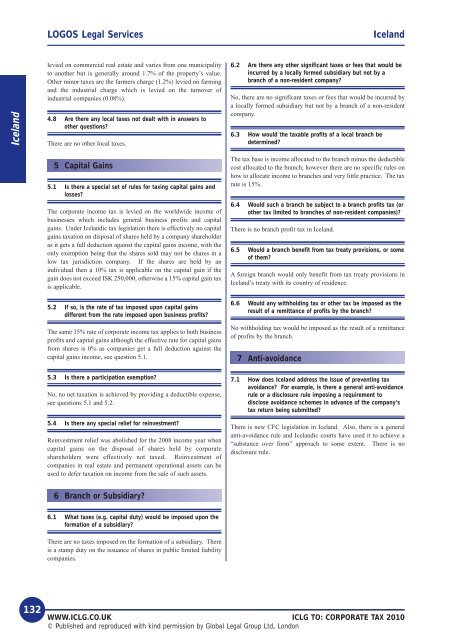Corporate Tax 2010 - BMR Advisors
Corporate Tax 2010 - BMR Advisors
Corporate Tax 2010 - BMR Advisors
Create successful ePaper yourself
Turn your PDF publications into a flip-book with our unique Google optimized e-Paper software.
LOGOS Legal Services<br />
Iceland<br />
Iceland<br />
levied on commercial real estate and varies from one municipality<br />
to another but is generally around 1.7% of the property’s value.<br />
Other minor taxes are the farmers charge (1.2%) levied on farming<br />
and the industrial charge which is levied on the turnover of<br />
industrial companies (0.08%).<br />
4.8 Are there any local taxes not dealt with in answers to<br />
other questions<br />
There are no other local taxes.<br />
6.2 Are there any other significant taxes or fees that would be<br />
incurred by a locally formed subsidiary but not by a<br />
branch of a non-resident company<br />
No, there are no significant taxes or fees that would be incurred by<br />
a locally formed subsidiary but not by a branch of a non-resident<br />
company.<br />
6.3 How would the taxable profits of a local branch be<br />
determined<br />
5 Capital Gains<br />
5.1 Is there a special set of rules for taxing capital gains and<br />
losses<br />
The corporate income tax is levied on the worldwide income of<br />
businesses which includes general business profits and capital<br />
gains. Under Icelandic tax legislation there is effectively no capital<br />
gains taxation on disposal of shares held by a company shareholder<br />
as it gets a full deduction against the capital gains income, with the<br />
only exemption being that the shares sold may not be shares in a<br />
low tax jurisdiction company. If the shares are held by an<br />
individual then a 10% tax is applicable on the capital gain if the<br />
gain does not exceed ISK 250,000, otherwise a 15% capital gain tax<br />
is applicable.<br />
5.2 If so, is the rate of tax imposed upon capital gains<br />
different from the rate imposed upon business profits<br />
The same 15% rate of corporate income tax applies to both business<br />
profits and capital gains although the effective rate for capital gains<br />
from shares is 0% as companies get a full deduction against the<br />
capital gains income, see question 5.1.<br />
The tax base is income allocated to the branch minus the deductible<br />
cost allocated to the branch; however there are no specific rules on<br />
how to allocate income to branches and very little practice. The tax<br />
rate is 15%.<br />
6.4 Would such a branch be subject to a branch profits tax (or<br />
other tax limited to branches of non-resident companies)<br />
There is no branch profit tax in Iceland.<br />
6.5 Would a branch benefit from tax treaty provisions, or some<br />
of them<br />
A foreign branch would only benefit from tax treaty provisions in<br />
Iceland’s treaty with its country of residence.<br />
6.6 Would any withholding tax or other tax be imposed as the<br />
result of a remittance of profits by the branch<br />
No withholding tax would be imposed as the result of a remittance<br />
of profits by the branch.<br />
7 Anti-avoidance<br />
5.3 Is there a participation exemption<br />
No, no net taxation is achieved by providing a deductible expense,<br />
see questions 5.1 and 5.2.<br />
5.4 Is there any special relief for reinvestment<br />
Reinvestment relief was abolished for the 2008 income year when<br />
capital gains on the disposal of shares held by corporate<br />
shareholders were effectively not taxed. Reinvestment of<br />
companies in real estate and permanent operational assets can be<br />
used to defer taxation on income from the sale of such assets.<br />
7.1 How does Iceland address the issue of preventing tax<br />
avoidance For example, is there a general anti-avoidance<br />
rule or a disclosure rule imposing a requirement to<br />
disclose avoidance schemes in advance of the company’s<br />
tax return being submitted<br />
There is new CFC legislation in Iceland. Also, there is a general<br />
anti-avoidance rule and Icelandic courts have used it to achieve a<br />
“substance over form” approach to some extent. There is no<br />
disclosure rule.<br />
6 Branch or Subsidiary<br />
6.1 What taxes (e.g. capital duty) would be imposed upon the<br />
formation of a subsidiary<br />
There are no taxes imposed on the formation of a subsidiary. There<br />
is a stamp duty on the issuance of shares in public limited liability<br />
companies.<br />
132<br />
WWW.ICLG.CO.UK<br />
ICLG TO: CORPORATE TAX <strong>2010</strong><br />
© Published and reproduced with kind permission by Global Legal Group Ltd, London
















